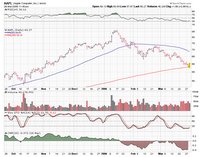The market focus this week was squarely on the
Fed policy meeting Tuesday, March 28. Hopes rose and fell on whether or not there would soon be some sign that the current round of rate hikes is nearing an end. In the end, the markets ended unchanged for the week as the outlook for Fed policy remained unclear.
The action began on Monday. That evening Fed Chairman Bernanke was scheduled to speak before the Economic Club of New York. There was much talk that he might give some indication that the rates hikes would soon end.
The Wall Street Journal quoted us as saying that was "absurd", and that proved to be accurate.
There was no way Bernanke was going to announce policy intentions to a private group before he had ever chaired a policy committee meeting. Not surprisingly, he merely re-iterated long-standing opinions about the yield curve, and his comments were widely considered unclear with regards to policy.
The sensitivity to Fed policy was highlighted again on Thursday. February
existing home sales data showed a surprising increase. This led to concerns that the Fed would be less likely to give indications of rate hikes ending if the economy was still strong. The S&P fell on the news.
On Friday,
new home sales data for February showed a decline of 10%. This news was received positively by the stock market as increasing the probability that the Fed would soon stop raising rates. In reality, it has little bearing. But it is interesting that the stock market now prefers
soft economic data because the focus has shifted to the interest rate implications.
Whether the Fed raises rates at the Tuesday meeting is not considered in doubt. The key question is whether they alter the policy statement to suggest that they will soon stop raising rates. The statement may change from the prior meeting, but it is unlikely that the Fed will provide much indication of the likely course for policy.
The Fed has made it clear that they will base policy on the incoming data. The economy remains strong, and while there are signs that inflation has remained stable, there are also signs that resource utilization remains an issue. That phrase was in the previous policy statement and refers to tight labor markets and high levels of capacity utilization in manufacturing.
The market may well be expecting too much from the policy statement.
There was other news for traders to act on this week, particularly among technology stocks.
Google stock price jumped Friday on news it would be added to the
S&P 500 index.
Oracle had a good earnings report.
Microsoft delayed the introduction of the consumer launch of Windows Vista.
Oil prices held their gains of last week and ended near $64 a barrel again. The 10-year bond yield also ended the week nearly unchanged at 4.66% from 4.67% the week before.
Next week's action is likely to be dominated by anticipation of, and reaction to, the policy statement on Tuesday afternoon.
-- Briefing.comlong GOOG, MSFT








